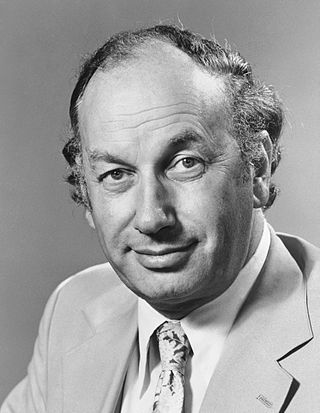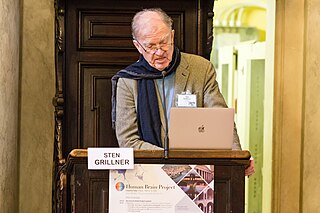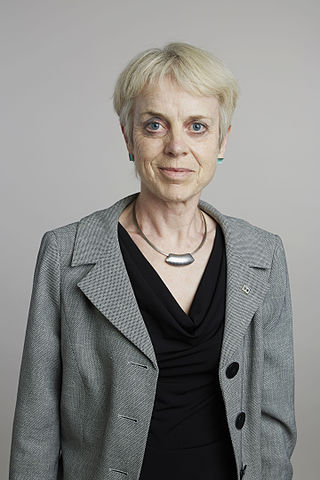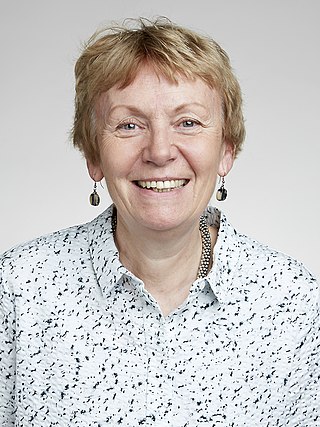
The National Institute of General Medical Sciences (NIGMS) supports basic research that increases understanding of biological processes and lays the foundation for advances in disease diagnosis, treatment, and prevention. NIGMS-funded scientists investigate how living systems work at a range of levels, from molecules and cells to tissues and organs, in research organisms, humans, and populations. Additionally, to ensure the vitality and continued productivity of the research enterprise, NIGMS provides leadership in training the next generation of scientists, in enhancing the diversity of the scientific workforce, and in developing research capacity throughout the country.
The National Institute of Arthritis and Musculoskeletal and Skin Diseases (NIAMS) is one of the institutes and centers that make up the National Institutes of Health, an agency of the United States Department of Health and Human Services (HHS).

Sir John Robert Vane was a British pharmacologist who was instrumental in the understanding of how aspirin produces pain-relief and anti-inflammatory effects and his work led to new treatments for heart and blood vessel disease and introduction of ACE inhibitors. He was awarded the Nobel Prize in Physiology or Medicine in 1982 along with Sune Bergström and Bengt Samuelsson for "their discoveries concerning prostaglandins and related biologically active substances".

Sir Salvador Enrique Moncada Seidner, FRS, FRCP, FMedSci is a Honduran-British pharmacologist and professor. He is currently Research Domain Director for Cancer at the University of Manchester.
The Kolling Institute is located in the grounds of the Royal North Shore Hospital in St Leonards, Sydney Australia. The institute, founded in 1920, is the oldest medical research institute in New South Wales.
The Richard Lounsbery Award is given to American and French scientists, 45 years or younger, in recognition of "extraordinary scientific achievement in biology and medicine."

David Colquhoun is a British pharmacologist at University College London (UCL). He has contributed to the general theory of receptor and synaptic mechanisms, and in particular the theory and practice of single ion channel function. He held the A.J. Clark chair of Pharmacology at UCL from 1985 to 2004, and was the Hon. Director of the Wellcome Laboratory for Molecular Pharmacology. He was elected a Fellow of the Royal Society (FRS) in 1985 and an honorary fellow of UCL in 2004. Colquhoun runs the website DC's Improbable Science, which is critical of pseudoscience, particularly alternative medicine, and managerialism.
UCL Neuroscience is a research domain that encompasses the breadth of neuroscience research activity across University College London's (UCL) School of Life and Medical Sciences. The domain was established in January 2008, to coordinate neuroscience activity across the many UCL departments and institutes in which neuroscience research takes place. In 2014, the Nobel Prize in Physiology or Medicine was awarded to the UCL neuroscientist John O'Keefe. In two consecutive years 2017 and 2018, the Brain Prize, the world's most valuable prize for brain research at €1m, was awarded to UCL neuroscientists Peter Dayan, Ray Dolan, John Hardy, and Bart De Strooper.

Sten Grillner is a Swedish neurophysiologist and distinguished professor at the Karolinska Institute's Nobel Institute for Neurophysiology in Stockholm where he is the director of that institute. He is considered one of the world's foremost experts in the cellular bases of motor behaviour. His research is focused on understanding the cellular bases of motor behaviour; in particular, he has shown how neuronal circuits in the spine help control rhythmic movements, such as those needed for locomotion. He is the current secretary general of the International Brain Research Organization (IBRO) and president of the Federation of European Neuroscience Societies (FENS). For his work, in 2008 he was awarded the $1 million Kavli Prize for deciphering the basic mechanisms which govern the development and functioning of the networks of cells in the brain and spinal cord. This prize distinguish the recipient from the Nobel prizes in basic medical sciences.

The wide dynamic range (WDR) neuron was first discovered by Mendell in 1966. Early studies of this neuron established what is known as the gate control theory of pain. The basic concept is that non-painful stimuli block the pathways for painful stimuli, inhibiting possible painful responses. This theory was supported by the fact that WDR neurons are responsible for responses to both painful and non-painful stimuli, and the idea that these neurons could not produce more than one of these responses simultaneously. WDR neurons respond to all types of somatosensory stimuli, make up the majority of the neurons found in the posterior grey column, and have the ability to produce long range responses including those responsible for pain and itch.
John Nicholas Wood FRS is a British neurobiologist, and Head of the Molecular Nociception Group, at University College London.
Graham Leon Collingridge is a British neuroscientist and professor at the University of Toronto and at the University of Bristol. He is also a senior investigator at the Lunenfeld-Tanenbaum Research Institute, Mount Sinai Hospital in Toronto.

Stuart Graham Cull-Candy is a British neuroscientist. He holds the Gaddum Chair of Pharmacology and a personal Chair in Neuroscience at University College London. He is also a member of the Faculty of 1000 and held a Royal Society - Wolfson Research position.
David S. Bredt is an American molecular neuroscientist.

Annette Catherine Dolphin is a British scientist who is Professor of Pharmacology in the Department of Neuroscience, Physiology and Pharmacology at University College London (UCL).
Mary Katharine Levinge Collins, Lady Hunt is a British Professor of virology and the director of the Queen Mary University of London Blizard Institute. She served as Provost at the Okinawa Institute of Science and Technology in Japan. Formerly, Collins taught in the Division of Infection and Immunity at University College London, and was the head of the Division of Advanced Therapies at the National Institute for Biological Standards and Control, and the Director of the Medical Research Council Centre for Medical Molecular Virology. Her research group studies the use of viruses as vectors for introducing new genes into cells, which can be useful for experimental cell biology, for clinical applications such as gene therapy, and as cancer vaccines.

Maria Fitzgerald is a British neuroscientist who is a professor in the Department of Neuroscience at University College London.
The Department of Pharmacology at the University College London, the first of its kind in England, was founded in 1905 and remained in existence until 2007.
Tara Keck is an American-British neuroscientist and Professor of Neuroscience and Wellcome Trust Senior Research Fellow, at University College London working in the Department of Neuroscience, Physiology, and Pharmacology. She is the Vice-Dean International for the Faculty of Life Sciences. She studies experience-dependent synaptic plasticity, its effect on behaviour and how it changes during ageing and age-related diseases. She has worked in collaboration with the United Nations Population Fund on approaches for healthy ageing. Her recent work has focused on loneliness in older people, with a focus on gender. She was named a UNFPA Generations and Gender Fellow in 2022.
Diane Lipscombe is a British neuroscientist who is a professor of neuroscience and the Reliance Dhirubhai Ambani Director of Brown University’s Robert J. and Nancy D. Carney Institute for Brain Science. She served as the president of the Society for Neuroscience in 2019, the world’s largest organization for the study of the brain and nervous system.









